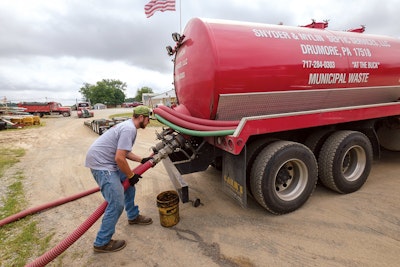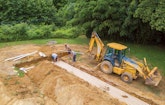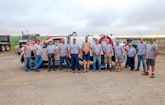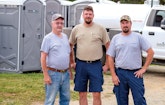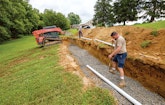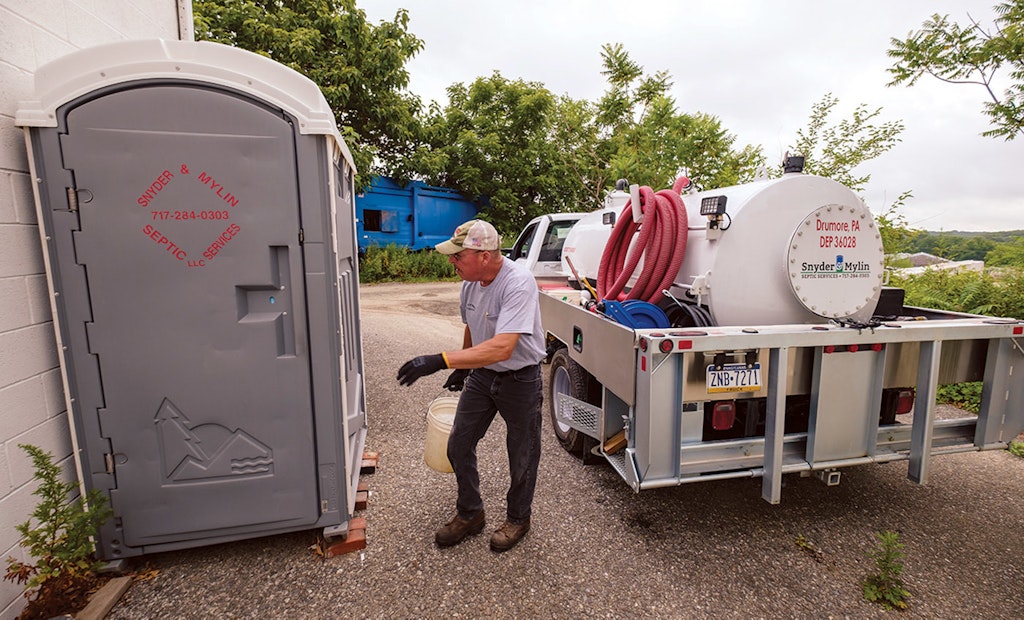
Technician Veryl Griest services a Satellite | PolyPortables restroom with the company’s newest service truck, a 2019 Ford F-550 with a Masport pump from Satellite Vacuum Trucks.
There’s a lot going on at the Snyder & Mylin property on state Route 272 in southeastern Pennsylvania. There is an excavation outfit, a septic pumping operation, portable restroom rentals, landscape supply division, and a truck and auto repair business. They are all owned and operated by Tim Mylin and his sons, Matt and Ethan Mylin.
“We try to be diversified just because my dad, who started this back in the late ’60s and early ’70s, went through a lot of different things over the years — recessions and slow times,” says Matt, 46. “Dad kind of figured out what things work and what things don’t. We’ve tried to branch out, too. My brother and I have explored different things. If some things are down and in decline, we have other things to pick up that income.”
Some of the diversification was intentional, and some of it, such as the landscape supply business, simply evolved as the company grew. When Snyder & Mylin moved to its current location in 2000, the property had more highway frontage and exposure than the excavating company really needed, so they leased part of the land to a business that sold mulch, decorative stone and landscape supplies. After a few years, that operator decided to move to another location.
“Basically, we already had the room allotted,” Matt says. “We had the equipment needed, mainly a loader. We had dump trucks from the excavating business to haul the product and deliver it. We had everything we needed except an employee to run it, so we decided we would keep it going and pick up another guy to handle the mulch and landscape supply.”
TURNING WRENCHES
The full-service garage was different. It started out of necessity, Tim recalls.
“A good mechanic is essential,” says Tim, 74. “I didn’t have enough equipment to keep a couple mechanics busy, so we opened it up to the public.” It took a few years for the automotive shop to carry its weight financially, Tim says, but like all the Snyder & Mylin ventures, it now operates in the black.
“If I took it on, it had to work,” Tim says. “We put in a lot of 80- to 90-hour weeks, but it had to work. I didn’t have any options. If I’d failed at one, I’d have failed at all of them. If I took something on, I gave it my all. I can’t think of anything I started that didn’t pan out.”
The auto repair business, called 272 Truck and Auto Service, started out doing state safety inspections as well as maintenance and repair work on the Snyder & Mylin excavating equipment, but it now also does state emission inspections and auto maintenance and repair work. Dan Mylin, Tim’s brother, manages the garage.
PUMPING AND PORTABLE SANITATION
The original company, called Long & Snyder, was formed in 1967, but Tim bought out Art Long in 1970, and the name changed to Snyder & Mylin. Matt and Ethan bought out Paul Snyder in 1999, but the name stayed the same.
The company originally did paving and excavating work and septic system installations. In 2005, Snyder & Mylin started another partnership with Ray and Jim Arnold, who had experience with the septic pumping and portable toilet rental business.
“We had done septic installs for years, but we never did our own pumping,” Matt says. “We talked a long time about wanting to put a pumper truck on. Finally, in 2005, these guys approached us and we said this is the time to do it. We had moved to a bigger facility, we were better equipped to handle it, and we had partners who wanted to get in. That’s when the septic services end got started.”
The Mylins bought out the Arnolds’ share of the partnership in 2014.
Adding pumping to their business mix led to Snyder & Mylin getting into portable sanitation.
“That end of the business keeps getting bigger and bigger,” says Ethan, 41. “We originally bought 50 (restrooms), and now we’re over 300. We’re adding 30 to 40 (units) a year.”
A FIT FLEET
Matt says he has a hard time keeping an accurate count of all the family’s trucks.
“There’s probably half a dozen heavier trucks, various service trucks and 10-15 pieces of excavating equipment at any one time. It’s not a huge amount, but we like to buy and sell things. We look for good deals at auctions. We very rarely buy new. We usually have three heavier dump trucks: a tri-axle, tandem axle and single axle.”
The excavating equipment includes several Caterpillar loaders, mini-excavators and a scraper, a couple John Deere backhoe loaders and a mixture of pieces from other manufacturers including Kubota and New Holland.
For septic pumping, the Mylins have a 2005 Kenworth with a 3,800-gallon steel tank and Masport pump.
The portable restroom service fleet has grown to four trucks, including the latest addition, a 2019 Ford F-550 with a 650-gallon waste and 300-gallon freshwater aluminum tank and Masport pump outfitted by Satellite Vacuum Trucks. The older units include a 2005 Ford F-550 with a 400-gallon waste and 175-gallon freshwater aluminum tank, a 2005 Isuzu NPR with a 500-gallon waste and 200-gallon freshwater steel tank, and a 2007 Isuzu NPR with a 300-gallon waste and 150-gallon freshwater stainless steel tank. All were outfitted by Pik Rite and carry Masport pumps.
Almost all the portable restroom inventory is from Satellite | PolyPortables.
INSTALLING CHALLENGES
The Mylins are expecting this to be a busy year for septic installations, in part because of a backlog from last year, when the summer and fall were too wet to get customers’ systems in the ground. New-home construction has slowed in the region, at least in the areas where septic systems would be required.
“Most of the building going on is in more congested areas where they are on public sewers,” Matt says. “A good portion of our work is repair work, which is basically a replacement — there’s not really much to repair for the types of systems we’re using here.”
Snyder & Mylin usually takes care of the entire process for customers: doing preparations for the soil testing, digging the percolation test holes, coordinating with the local sewer enforcement officer and installing the system.
“My brother and I do a lot of design work as well,” Ethan says. “Anything with a drainfield under 2,000 square feet we can design. Over that and it has to be done by an engineer. Matt and I have been installing since we were kids, and we understand how they work and go in.”
The area the company services is in the triangle between Philadelphia, Baltimore and Harrisburg, Pennsylvania, so it is fairly densely populated. But there is a lot of farming in the area and a substantial Amish population. Doing excavation work for local farmers helped keep the company going during times when construction slowed down.
“This business has always been up and down,” Tim says. “When times are hard and the builders quit, there’s nothing you can do, so I stayed with the farmers. I diversified enough that I would work for a lot of farmers because they would spend money when the builders weren’t doing anything. Farmers are always doing something — a lot of waterways and stormwater work. They are always building, especially the Amish.”
DEMAND FOR RESTROOMS
Serving the Amish population is a special niche in the Snyder & Mylin portable restroom business as well.
“It’s surprising the number of toilets they will rent for funerals and weddings,” Matt says. “November is the big wedding season around here. It’s usually a Tuesday or Thursday in November, although sometimes it carries into December. They’ll rent three or four or half a dozen (restrooms), depending on how big the wedding is. Usually the units are coming back from the parks at that time so we have them available.”
Another niche that is peculiar to the geographical area is what is known locally as a mud sale.
“We have a lot of fire company sales. Local volunteer fire companies will have big auctions,” Matt says. “They usually start in mid-March and run to about May. They call them mud sales because it’s usually when the frost is coming out of the ground and everything turns into a big muddy mess. They are just big consignment auctions that draw huge crowds. What we’ll usually do is donate several toilets and then charge them for some. We can make a nice profit on it and give some back to the local fire company by donating a few of the units.”
Other special events the Mylins serve include the two-day Freedom Fest for the Chester County Parks on the Fourth of July. The company already has some portable restrooms in the park where the event is held, but another 40 or more are required for the event. There are also some music festivals.
HANDLING SPECIAL EVENTS
Special events can be difficult, but Matt has found that oversupplying the site with restrooms makes it easier for both the supplier and customer.
“It’s better to provide more units than what would normally be needed, saving that service in the middle of an event,” Matt says. “For that Freedom Fest, the units would be there on Friday, and we would have to go down on Friday night or Saturday morning to service them. It got to be so many people in such a tight area that it was difficult to get anything done and service toilets. We talked with the Parks Department and said let’s get twice as many units and cut out that service in the middle.
“It worked out better for everybody. It worked out the same for them, dollarwise, and we weren’t paying drivers to come down on the weekend on overtime. The condition of the units seemed pretty good. We weren’t running out of paper; toilets weren’t getting too full. We made sure there were plenty of units for the event.”
Matt says the strategy doesn’t work for a longer event.
“There is a local fair in the fall and it’s a three-day event, and you just have to go service them in between,” he says. “Every day you have to be servicing. There’s no getting around that.”
Matt says that 40% to 50% of the portable restroom business is at construction sites, where Snyder & Mylin tries to keep a cleaner, newer unit than what might be typically found on a work site. Another big portion of the company’s portable restroom business is in parks and recreation areas, some of which have restrooms all year long but they usually have a lot more in the summer.
“We’re doing weekly service on them, sometimes twice, depending on the use,” he says.
TIME FOR REFLECTION
Tim can now look back at a long and diversified career as an entrepreneur.
“I was 25 when I went to work for myself,” he recalls. “I was fresh out of the Army so I didn’t have a whole lot to lose. I was married not quite a month when I went home and told my wife I quit my job and wanted to start my own business. That didn’t go over real big, but she stayed with me.”
When he started, his partner handled paving and Tim did the excavating. Tim started installing septic systems in the late 1960s. “In those days, we were building cesspools,” he says, “As the systems became a lot more elaborate, a lot of the older guys dropped out, but I stayed with it and kept up on it.”
Another reason for his success was that builders and farmers knew he would be around to stand behind his work.
“I knew and they knew that I would be there next year or 10 years from now,” he says. “That means a lot when you are spending that kind of money.
“Looking back, it’s been a hell of a ride,” he says. “I don’t have any regrets, other than I wish I had spent more time with my wife, Linda. She passed away in ’92. She was quite an asset to the company. She’s not here to enjoy the fruits and the boys, but I am, and I am still enjoying them.”
The treatment plant that never happened
Tim Mylin, who owns Snyder & Mylin Septic Service with his sons, once tried to build his own wastewater treatment plant. Unlike his other enterprises, which include a septic installation business, an automotive repair shop and others that have all been successful, this venture never got off the drawing board, and Mylin is happy about that.
In the 1980s, Mylin was installing septic tanks, not pumping them, but he realized pumpers faced a difficult situation trying to dispose of their waste. The small treatment plants in Lancaster County, Pennsylvania, did not want to accept waste from septic haulers because it had such a high BOD.
Pumpers were hauling waste long distances or applying the waste to farm fields. The state of Pennsylvania withdrew all the permits for applying waste to farm fields because so many wells were being contaminated. That meant the pumpers had no choice but to make long, expensive trips to dispose of their waste.
Mylin decided to build his own wastewater treatment plant. He and his late wife, Linda, spent about eight years going to hearings, and they spent a lot of money getting a plant designed. Mylin had a 30-acre site and the support of the Providence Township Board, but he faced opposition from neighbors of the site.
Eventually he prevailed and received a permit for a 30,000-gpd plant that would discharge into Pequea Creek, a tributary to the Susquehanna River. His plan was to build a 60,000-gpd plant and hope to expand his permitted discharge as he developed a record of good operations.
But the political environment changed just as he was about to begin construction, and the state began to reissue permits for land application of septage. Although he and his wife had invested a lot of time and more than $200,000 in engineering and other development costs, he considers it a fortunate development that he hadn’t already started building the plant before the political situation changed.
“We would have been sitting on a $2 million plant with no one to use it,” he says, “It was an expensive lesson learned. In 1996, I got my approval after eight years, but I never realized how much politics could influence my life.”
Now the county has a treatment plant that accepts waste from septic pumpers, and the Snyder & Mylin wastewater treatment plant that never got built is just another interesting chapter in the company’s history.
